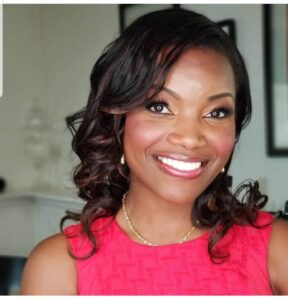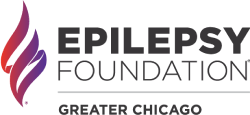Faces of the Foundation: Dr. Heard

As the world battles COVID-19, the knowledge and advice from a trusted medical professional can make an enormous difference. Takijah Heard, MD is NorthShore University HealthSystem’s Division Head of Child Neurology and Director of Pediatric Neurophysiology. She is also on the Epilepsy Foundation of Greater Chicago’s Professional Advisory Board (PAB) and offers great insight for those living with epilepsy concerned about how COVID-19 can impact their medical condition.
“Epilepsy does not increase a person’s chances of getting COVID-19,” Dr. Heard states. “There are factors of the virus to keep in mind, however.”
A dry cough and shortness of breath are common symptoms of COVID-19. These symptoms can be harmful to people who experience respiratory distress when having a seizure, according to Dr. Heard.
“It is important to manage any respiratory issues as quickly as possible,” says Dr. Heard. “There are decongestants that can open up a person’s airway and other medications that can help the healing process.”
Dr. Heard recommends that a person living with epilepsy contact their primary care physician if they feel that they may have COVID-19 and adhere to their doctor’s advice. If they do begin having seizures, she says they should contact their neurologist. Fortunately, Telehealth has given doctors and patients the opportunity to connect without having to meet in person. Dr. Heard believes that this is a very effective way to meet with patients and is currently utilizing Telehealth on a regular basis.
“Telehealth is a great option,” says Dr. Heard. “It is important to stay isolated right now and my patients can talk with me from the safety of their home. On video calls, we are face to face and I can see and understand their emotions.”
Dr. Heard says that she has not heard of any shortages in anti-epileptic drugs but recommends asking if your supply can be increased.
“Insurance companies might increase your supply, and that lessens the amount of times you will need to go to the pharmacy. You can also have your prescription delivered. Most importantly, always wash your hands when taking your medication.
“We must all practice the standard safety precautions,” Dr. Heard says. “Stay home. Do not expose yourself. Also, make sure people who need care get care.”
Dr. Heard knew she wanted to be a pediatrician after seeing Dr. Huxtable’s practice on The Cosby Show. She wanted “to be with and care for kids.” In medical school she did a research project on seizures so she would be prepared when a patient had one.
“I fell in love with epilepsy,” Dr. Heard says. “I wanted to help others who might be struggling because they look ‘normal,’ but have a serious condition to face at the same time. There is also such a wide gamut… a person with epilepsy can be developmentally delayed, or in a wheelchair, or they could be in seizure remission. There is a lot of ground to cover.”
Dr. Heard has travelled the world to help people with epilepsy. She has been involved in many missionaries in places such as Kenya, Tanzania, and Costa Rica.
“There are a lot of misconceptions about epilepsy,” says Dr. Heard. “Some cultures believe that a person with epilepsy is possessed. They can be ostracized. I want to increase epilepsy awareness and treat those in need. It’s my life’s work.”
Dr. Heard is clearly committed to the epilepsy community in the greater Chicagoland area. As a member of the Foundation’s PAB, she sees the importance of their work.
“The Foundation allows patients to have a community. I want to make sure everyone is included, and EFGC is that bridge.”
